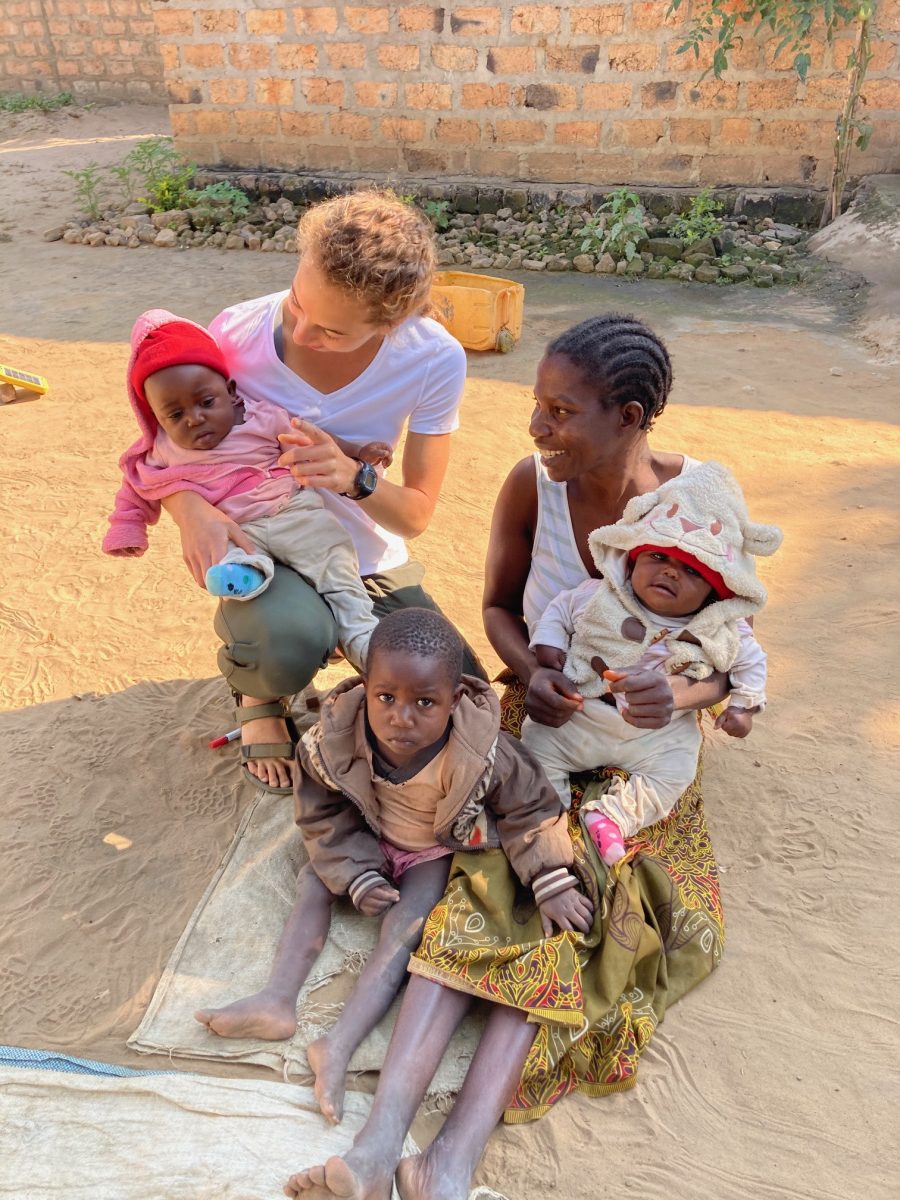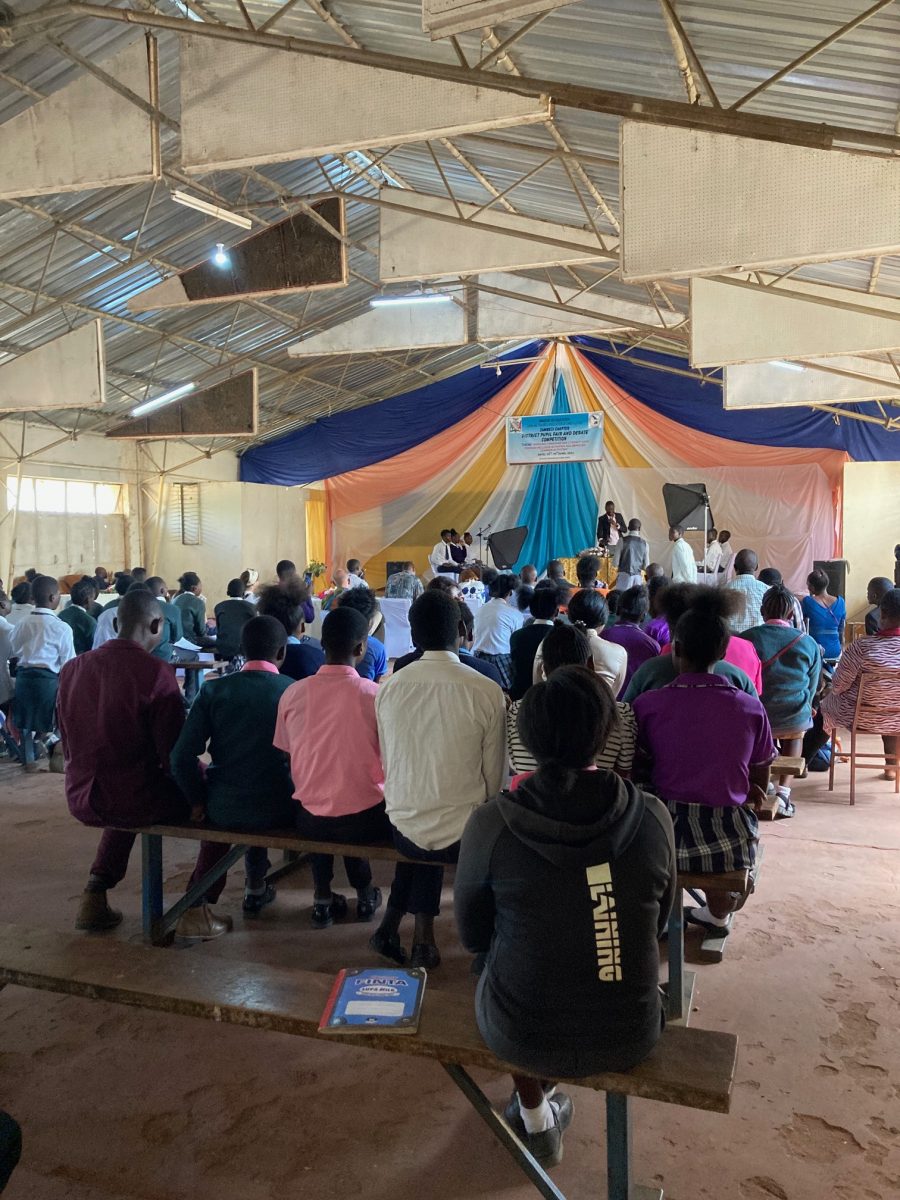
Hello to everyone back home from Hattie and the rest of the Gonzaga-in-Zambezi crew! As I write this blog post, I am well aware of how soon we will begin our trek back home. To me, it feels like I am just starting to cultivate relationships and have meaningful experiences as the time for our goodbyes draws nearer.
This morning I had the opportunity to accompany my homestay host mom, Winfrida, on her regular visits to the homes of HIV/AIDS patients. These patients live on the margins financially and sometimes struggle with isolation and the potential stigma of the disease they carry. Winfrida told me that she usually visits seven patients, but today we only met three. The walk to see those three patients was probably a few miles, and I was left in awe by the way this elderly woman has given of herself over decades to help with something she’s passionate about.
The first family I met was much like others we’ve met in Zambezi. The mother shared the struggles of providing food and clothing for her children, and balanced their needs with her own desire to return to school (she became pregnant before completing secondary school). The next woman I met was an HIV-positive grandmother who took in her grandchildren after her daughter died of HIV. Though both of these women shared their struggles and asked for support, the 8 month-old twins of the first woman seemed lively and the simple furniture of the second seemed extravagant compared to the meagre life of the third family I met. This patient supported her children off nothing but an occasional odd job. She said she did not know what they would eat today and described the dizziness that results from taking her medication without food. I watched her young daughter start chewing on the remains of a plastic bag; when I looked again it had disappeared. The two young children that sat with us wore clothes so tattered that they barely served their purpose. They did not speak or smile. As I left, the young boy looked on the verge of tears, and I felt incredible remorse that I didn’t have even a granola bar in my pocket to offer to him.
Despite the hardships I witnessed today, Winfrida was happy to introduce me to a part of Zambezi I’d never seen before. She took pride in the Zambian camaraderie we experienced as we walked, and she encouraged me to take pictures of the modest homes of those we visited. At first I was concerned about invading the families’ privacy and playing into the harmful stereotypes about people in the Global South, but she said it was important to show those back home what they are experiencing here. Despite all that she’s already done, as we walked back to the convent Winfrida shared her frustrations that she could not do more. She explained that if she could, she would set up a shelter at her home and take in those who needed food and a place to sleep until they were stable enough to return to independence. I was inspired by her desire to help those less fortunate, a desire shared by many community members here. They do not have much to spare, but they give away any extra and more. If those with little can give a little, how much more can I, who have so much, give back my time, talents and money?
When I returned to the convent, the health team had returned from their last day at the hospital, where they had visited the ward for HIV/AIDS patients and then learned about screening for cervical cancer. Everyone on the health team said that it was a good way to end their time in the hospital.
Jeff, Dee, Kylie, Megan, and Lauren were still across the river teaching the Days for Girls and Men Who Know programs in Mize. They said that this group was very mature and received the information about menstruation and the male and female reproductive systems very well.
Since Dee, Mama’s Helper for the day, wasn’t around, I offered to help Mama Katendi prepare lunch. As I worked alongside her, I thought about how much I will miss the familiar presence of this woman— the companionable silence, laughs, and even tears that we’ve shared (don’t worry— it’s just that there were a LOT of raw onions involved with today’s lunch). Mama Josephine’s departure made me realize that I have grown accustomed to the steady presence of these women, and that it will be difficult to leave.

After lunch, Kris, Jeff, Kylie, Lauren, and I headed to Zambezi Boarding School for the local debate competition. Though we were unfortunately only there for a debate between two other schools, we received news later that Zambezi Boarding won the competition! When I first met these students a few weeks ago, they were just starting to learn the different roles and rules of debate. Now they are the best debate team in the district, and I could not be more proud of them!
This morning I witnessed the devastation and desperation within Zambezi; this afternoon I witnessed its potential. The students and teachers at Zambezi Boarding School radiate passion and inspiration, and I am so grateful that I have been able to be a part of these students’ journeys in my time here.
After the debate competition and the health team’s last class, a large group of us headed to Debby and Eucharia’s house for our last ZamCity. We played an intense game of ultimate frisbee. Some super competitive sides came out, sometimes preventing the ZamCity kids from getting a turn with the frisbee (cough cough, orange team, which was also Jeff’s team— who would have guessed?). Meanwhile, Grace Ehler’s volleyball instincts came out which led to some sick dives and scores for the green team.
Though difficult, I will forever be grateful for each and every experience I had today. In one day I saw the rich diversity of life experiences, social status, and income levels here in Zambezi. I look forward to the last experiences we will have in Zambezi before boarding the tiny planes back to Lusaka.
I cannot believe that we will already be leaving in a week. Though we will be sad to say goodbye, we have been fantasizing about the coffees we’re going to get at the airport, the movies we want to watch on the airplane, the foods we’re most excited to eat when we return to the states, and, of course, the loved ones we can’t wait to be with. Thank you all for following along on our journey. See you soon!
Hattie Harrold, ‘26

Oh Hattie, what a powerful post. When you said, “They do not have much to spare, but they give away any extra and more. If those with little can give a little, how much more can I, who have so much, give back my time, talents and money?” I heard your connection and deeper transformation — we belong to each other. Period.
It is an honor to stack hands with you and become a part in solidarity to this community. Thank you.
Pam
Hattie, so very proud of you and your adventure. Sounds like you made the most of what time you had. Some of your descriptions of poverty, disease and yet hope reminds me of my two years spent in Ethiopia. Long ago but many memories still linger. Can’t wait to hear even more upon your return. Love, Uncle Paul
Hattie, you’re the best ever. I am so grateful for our friendship. I appreciate the way that you experience our world. It is with such grace, ease, and thought. I am so grateful you have been able to have this experience. Thank you for letting us in on what that looks like. Miss you, call me soon!